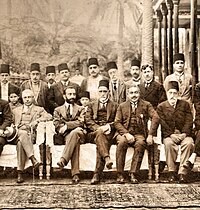Iraqi Jews

Iraqi Jews are people who lived in Iraq and practiced Judaism, a religion that follows the teachings of the Torah. They were a small minority in Iraq, making up around 4 percent of the population before World War II.
Before Israel became a country, Jews lived in many different countries around the world. Iraqi Jews, like all Jews at that time, faced persecution and discrimination. The situation worsened after the establishment of Israel in 1948, causing many Iraqi Jews to flee their homes and leave the country.
In order to understand the situation of Iraqi Jews, it is important to know a bit about the history of the region. Iraq was once part of the Babylonian Empire, which was home to one of the largest Jewish communities in the world in the 6th century BCE. Jews lived in Iraq for centuries, but their lives changed dramatically in the 20th century.
In the 1940s, anti-Jewish riots broke out in Iraq, leading to the deaths of hundreds of people. In 1950, the Iraqi government passed a law that allowed Jews to leave the country, but only if they gave up their citizenship and left all their possessions behind. This led to the mass exodus of Iraqi Jews to Israel, which was newly established as a Jewish state.
The situation for Iraqi Jews improved somewhat in the 1960s and 1970s, when the country became more secular under the rule of Saddam Hussein. However, many Jews had already fled and settled in other countries.
Today, there are very few Jews left in Iraq, and most of them are elderly. The legacy of Iraqi Jews lives on through their descendants, many of whom are proud of their heritage and work to keep their traditions alive.
Before Israel became a country, Jews lived in many different countries around the world. Iraqi Jews, like all Jews at that time, faced persecution and discrimination. The situation worsened after the establishment of Israel in 1948, causing many Iraqi Jews to flee their homes and leave the country.
In order to understand the situation of Iraqi Jews, it is important to know a bit about the history of the region. Iraq was once part of the Babylonian Empire, which was home to one of the largest Jewish communities in the world in the 6th century BCE. Jews lived in Iraq for centuries, but their lives changed dramatically in the 20th century.
In the 1940s, anti-Jewish riots broke out in Iraq, leading to the deaths of hundreds of people. In 1950, the Iraqi government passed a law that allowed Jews to leave the country, but only if they gave up their citizenship and left all their possessions behind. This led to the mass exodus of Iraqi Jews to Israel, which was newly established as a Jewish state.
The situation for Iraqi Jews improved somewhat in the 1960s and 1970s, when the country became more secular under the rule of Saddam Hussein. However, many Jews had already fled and settled in other countries.
Today, there are very few Jews left in Iraq, and most of them are elderly. The legacy of Iraqi Jews lives on through their descendants, many of whom are proud of their heritage and work to keep their traditions alive.
Related topics others have asked about:
